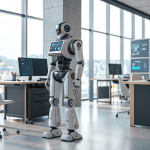As artificial intelligence continues to reshape industries and society, discussions around preparedness are becoming essential. A recent thread explored how individuals are preparing for advanced AI and helping their families adapt. Responses ranged from financial planning and career shifts to emotional and philosophical readiness.
Adaptation Through Education and Skills
Education and skill-building emerged as a dominant theme. Many shared their efforts to upskill themselves and their families, particularly in understanding and using AI tools. For instance, one user emphasized teaching their parents basic AI literacy, starting with voice assistants and moving to more advanced applications. Others pursued certifications, reflecting a growing demand for formal training in AI technologies. This proactive approach highlights the importance of learning to leverage AI tools effectively, whether for professional or personal purposes. Explore more strategies for adapting to AI in our opinion section.
Financial and Career Strategies
Financial readiness was another significant focus. Some advocated investing in high-growth tech companies or ETFs, while others emphasized accumulating capital to secure future access to advanced AI-driven resources. Career strategies included transitioning into roles that heavily incorporate AI to stay relevant in a rapidly changing job market.
One insightful comment noted the disparity between replacing white-collar jobs, like legal assistants, and blue-collar roles, such as plumbers. It stressed the importance of considering both technological feasibility and economic practicality when evaluating AI’s impact on employment. Discover how leaders are navigating these challenges in our interviews with AI experts.
Philosophical and Emotional Preparation
Beyond practical measures, participants reflected on emotional and philosophical readiness for an AI-driven world. Stoic philosophy was cited as a helpful framework for navigating uncertainty and maintaining focus on long-term goals while staying present.
A key takeaway from the discussion was the need to embrace adaptability, summarized by one user’s observation that life must be “reoriented for ever-accelerating change.”
Supporting Families and Communities
The conversation extended to preparing families and communities for the AI era. Encouraging open discussions, bridging the digital divide, and promoting ethical considerations were recurring themes. As one user aptly stated, “Talk to your community. The divide will be a dangerous chasm.” This highlights the importance of collective action to ensure AI benefits society equitably. Find additional insights in our curated products section featuring tools for educators and families.
Challenges and Ethical Considerations
While many responses were optimistic, others raised concerns about wealth inequality, social unrest, and ethical issues. One participant observed, “AI is an arms race we can’t stop, and its progress is inevitable.” These remarks underscore the need for thoughtful policies and governance to address the technology’s broader implications. For updates on AI-driven changes and events, visit our events page.
Conclusion
Preparing for advanced AI requires a multifaceted approach, balancing education, financial planning, emotional resilience, and community engagement. As AI continues to evolve, staying informed and adaptable will be crucial. By taking proactive steps today, individuals and families can better navigate the opportunities and challenges of tomorrow. Explore the latest press releases and updates in our press release section.


